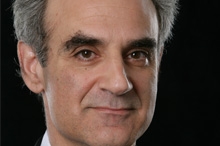

Gary Cohen is being honored as a Champion of Change for his work on the front lines to protect public health in a changing climate.
As we continue to learn more about climate change, we are realizing that it is fundamentally a health issue that will affect everyone in the world. How it damages our health depends on where we live. If we live in Beijing or Baton Rouge, Louisiana, the air could become so poisoned we can't go outside of our homes. If we live in the Midwest of the United States, extreme weather may wreck our communities and heat waves may destroy our crops and increase risk of heat exhaustion. If we live in New York or New Orleans, we may experience stronger hurricanes more often that can flood our streets, trap us in homes with no power, and shut down our hospitals. For many communities climate change can lead to increased risk of asthma among our children and respiratory disease among our most vulnerable citizens. We are learning that climate change impacts can change the patterns of infectious diseases like Dengue fever and malaria, which are spreading by mosquitoes to places that have never seen these diseases before. We are learning that it is not possible to have healthy people on a sick planet.
These are all reasons why the healthcare sector has a unique responsibility to lead the fight against climate change.
First, we need to get better prepared for climate change impacts in our communities. Our hospitals and clinics need to be resilient and fortified so they can anchor the community response during extreme weather events. They need to be the last buildings standing in a hurricane rather than one of the first ones to go down. For example, if hospitals have on-site power they can continue to provide critical care to patients even if the grid is down for days. On-site power can also make hospitals more energy efficient, reduce greenhouse gas emissions and help hospitals save money.
Second, the healthcare industry appears to be addicted to fossil fuels. Hospitals use twice as much energy per square foot as schools and offices in part to fuel all the life-saving equipment they operate 24/7. That makes hospitals major carbon polluters. Given that healthcare is underpinned by an ethical imperative to “First, Do No Harm," they have a responsibility to reduce their carbon pollution and be leaders on renewable energy, energy efficiency, and other carbon mitigation efforts that support healthier people in healthier communities. Healthcare represents 18 percent of our economy. If we can harness the purchasing power of this critical sector, we can drive our economy toward a low carbon development path that will reduce our rising disease burden and spiraling healthcare costs. Toward this end, we have built a global coalition for Healthier Hospitals that is accelerating the adoption of sustainable and climate-friendly practices.
Third, healthcare professionals are some of the most effective spokespeople in our society. When we wanted society to address tobacco, we got nurses and doctors to stop smoking first. We banned cigarettes from hospitals, and we educated our patients about the dangers of tobacco. In the global campaign to kick our addiction to fossil fuels and toxic chemicals, doctors, nurses, and other healthcare workers need to be powerful spokespeople for policies that put a price on carbon and support the transition to a renewable energy and toxic-free future. There are 5 million healthcare workers in America. We can enlist them to become climate champions in our communities for local solutions and critical spokespeople at the state, national, and global levels for laws and treaties to rein in carbon pollution.
In this next period of our collective history, we will need to redefine the purpose of healthcare. It can no longer be exclusively focused on treating chronic disease in individual patients. Healthcare needs to expand its mission and address the environmental and social conditions that are making people sick in the first place. Healthcare needs to lead the fight against climate change. It is our best remedy to this global health emergency.
Gary Cohen is the President of Health Care Without Harm and Co-Founder of Healthier Hospitals Initiative.


